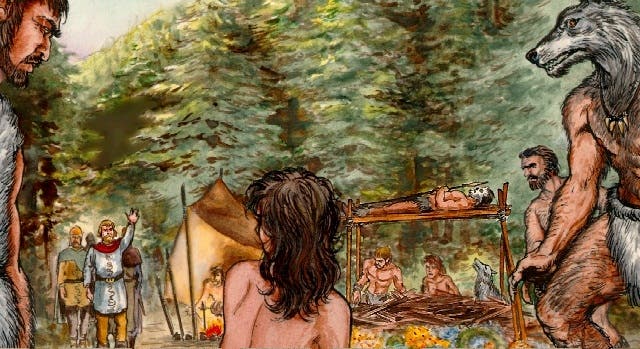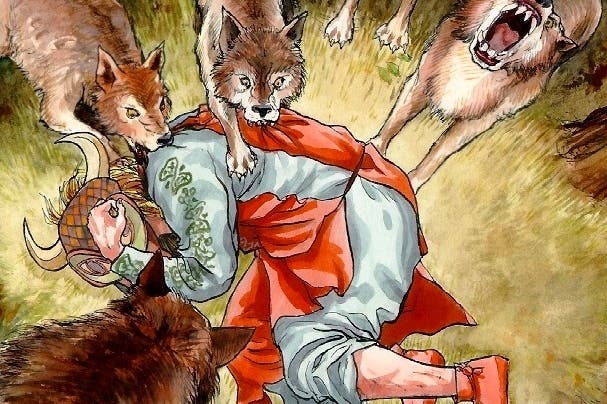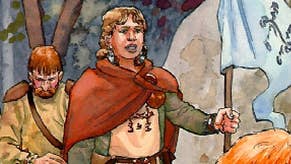The story of King of Dragon Pass: Do you remember Demolition Man?
It's all about second chances.
This is the story of King of Dragon Pass, an uplifting tale of a man you probably wouldn't notice who bet big on an obscure game a long time ago - and lost. It's uplifting because he got a second chance, a bit like when Lieutenant John Spartan got a second chance in Demolition Man to catch the villain Simon Phoenix after having been cryogenically frozen in time.
Our story starts in 1996, three years after Demolition Man, and in the brain of David Dunham. He liked playing tabletop role-playing games in the setting of Glorantha - ring any bells? - and made computer software for a living. He happened to be friends with Glorantha creator Greg Stafford - renowned for his work on role-playing game Pendragon, and also a shaman - and the two of them decided to make a computer game based in that setting. And so David Dunham set about making "a game that had never been done before".
Not that he had a particularly springy springboard to launch his game making endeavour from - his computer software company A# employed only two staff: him and his wife. I'm a bit surprised, then, when David Dunham tells me King of Dragon Pass cost, in the late-'90s, half-a-million dollars to make! "Heh, it was quite expensive actually," he almost blushes. "It was very ambitious."
In the end it took three years to make. Pre-production began in 1996, production a year later and release was originally planned for '98, but slipped to '99. At peak development, 12 people worked on the game, mostly on the art. Some 430 pieces were drawn to frame the scenarios the story-book-like game presents you with. The team was scattered but coordinated in Seattle by the ambitious husband and wife team.
The money for development came from private funding, and Dunham had hoped that King of Dragon Pass would catch the eye of a publisher that would do the rest - print CDs, put them in boxes, get them on shelves and tell everyone about it. But he was to have no such luck, and his back-up plan was to do it all himself, which was just about possible for a small team back then using mail order. "I had to learn a little bit about boxes and CD mastering," he says in a fit of understatement - but what else could he do? It wasn't like he could release a 450MB game on the internet in 1999.
"It was going to happen, so in one sense it wasn't stressful - it was within capability to do. I did eventually have to scrounge and take out a loan to fund the CD production. But at least I was able to pay that back."
"Heh, it was quite expensive actually"
David Dunham
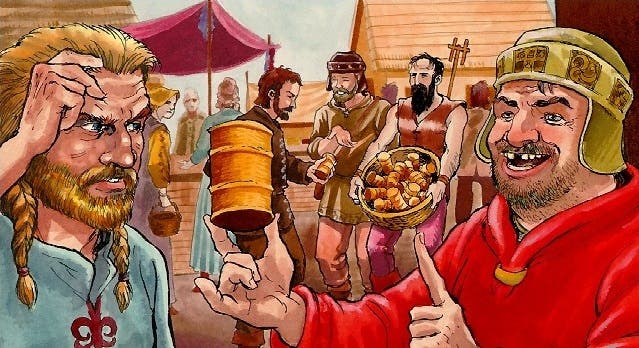
Yet with no publisher to buy shop shelf space, King of Dragon Pass never made it into true US distribution - you could buy it in hobby stores but not in Electronics Boutique. There were broken promises from distributors - "that was a big disappointment" - and it all amounted to under 8000 sales for the original release of King of Dragon Pass, a sum that does not repay $500,000. "We have not made money," Dunham admits.
Thankfully, "Everyone was paid, and we'd already paid all of the development team, the artists and all. That was always something - we wanted to treat people right and not make 'em, 'Oh we'll give you something out of the royalties.' Which never happens."
The saving grace for King of Dragon Pass was its reviews, which surprised Dunham. "Pretty much every review was really good," including Eurogamer's brief 2001 review, which has somehow lost its score. Unfortunately the two negative reviews were in influential US print magazines. "If those two bad reviews would have been in the UK market, which is smaller, we could have sold a lot more copies," he rues.
"What we did get was a glowing review in a magazine called Pelit, which is the premier magazine in Finland. In its market it was only number two behind Donald Duck, which is a huge craze in Finland," obviously, "so all of a sudden we were getting bulk orders from Finland. It's still a very small country, but I think it was our number-three country after the US and the UK.
"It kept selling - I think it was two years in Finland that the distributor kept ordering."
King of Dragon Pass wasn't a commercial disaster, unlike some other more expensive games at the time - "at least we weren't those guys!" - and sales trickled on for years. Even when the print-run inventory ran out, the tenacious husband and wife team carried on, fulfilling orders with CD-ROM copies of their game.
"People were still wanting the game and we were still sending out several copies a month. Even up until recently - believe it or not I sent out a CD master yesterday! Someone insisted that they wanted the CD."
"That was kind of it. Like most games, they don't last forever"
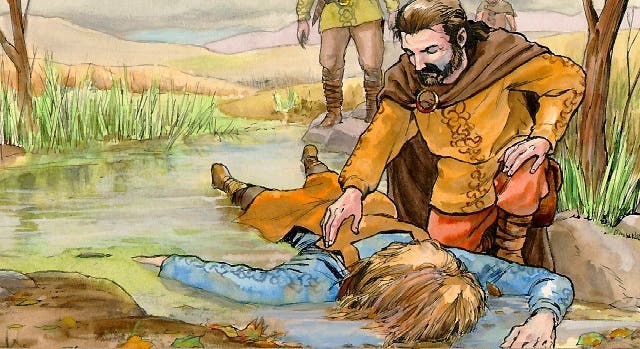
Return of the King
There was a flicker of life in King of Dragon Pass, then, but "I don't think you'd really call it alive", says Dunham. He ended up using it more as a portfolio piece, and it eventually landed him a job at a studio making casual games. His ambitious "game that had never been done before" had swung and missed, and fizzled out, and he had no desire to resurrect it.
"No, you know, it had been done and there was no other - I had tried the let's sell it online thing and it didn't seem to work. That was kind of it. Like most games, they don't last forever."
David Dunham put King of Dragon Pass to bed and got on with his life. But then in 2007, Apple changed everything by releasing a snazzy little touch-screen device called iPhone. "The fact is, King of Dragon Pass was originally sketched for Apple's Newton," reveals Dunham, referencing Apple's PDA, which died in 1998. "It didn't stay as a handheld game for very long, but the whole idea of having interactive story choices on a small screen was actually the original idea, so it was in the back of my mind that maybe you could fit it on an iPhone. It's a smaller screen, by a lot, than we shipped for, and it would probably be a big download...
"At some point I started sketching out could the interface possibly work on a smaller screen? And it turned out that it can work."
Not only did it work, two-thirds of it worked "pretty much instantly", and David Dunham found himself resurrecting his three-year magnus opus part-time and on his own. Eventually he had to hire another person to help redesign the interface, though, and where else would he find help than through his contacts in Finland, who put him on to a young artist only too happy to get a foot in the door.
Everything was going smoothly until Apple showed up again in January 2010 and announced the iPad. "It was kind of like 'oh no!'," he recalls, wincing at memory of taking on yet another project. There was more to it, too. "I wasn't actually sure it would work on iPad, believe it or not. We didn't have big enough art. The original game was 640x480, which seemed like a plausible size in 1997 ... but now we have a mobile device that was bigger than our screen, so I didn't want it to look entirely stupid."
"...so it was in the back of my mind that maybe you could fit it on an iPhone"
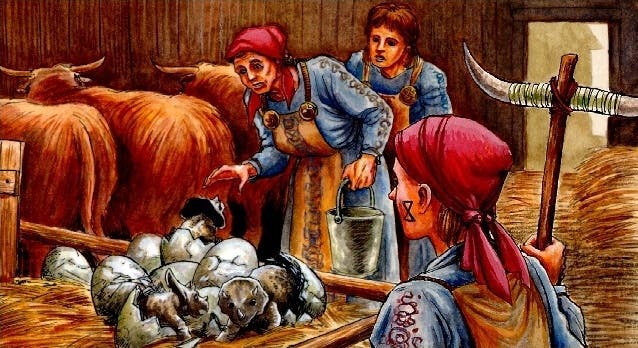
The iPhone and iPad version were both finished and released, however, the iPhone version in September 2011, the iPad version a year later. And despite his original worries, it's the iPad version he's most proud of today. "That's really the device it works best at," he beams. "It really feels like reading a book. It is an interactive novel in the true sense, not just the Choose Your Own Adventure." The iPad version of King of Dragon Pass certainly did the trick making a convert of our Richard Stanton.
At £7 on the App Store, King of Dragon Pass is not cheap, but in March this year David Dunham announced that iOS sales had passed 30,000 - success at long last. "It's actually one of the more successful games in terms of sales [on the App Store], which is actually kind of astonishing."
King of Dragon Pass would get a third chance, too, when in August 2012, Good Old Games somehow worked out a way to make the game downloadable. "I have no idea what they did," he shrugs, "but it was definitely nice to see it back on the market in a meaningful way, and not just a few CDs - it actually sold pretty well." Not as well as the iOS versions, but "certainly more than the original".
The second coming of King of Dragon Pass has made David Dunham somewhere in the upper-bound of £200,000. "It's never been the sole source of income but it's definitely been a help," and I flush green with envy. I guess it means he's finally made his money back on that ambitious bet he made all those years ago.
So what's next? In the short-term, more interactive stories for King of Dragon Pass - at least 12, but maybe as many as 24. "It takes a while because I'm the only author at the moment. But that's coming along." Long-term? "Not sure I have an answer on that one. My day job now is working at Shenandoah Studio," creator of fantastic iPad game Battle of the Bulge, "and that's taking up most of my time.
"There's no way a sequel can be a part-time thing," he adds, answering the inevitable question. "Also, what people expect and what I'll do will probably not be the same thing. King of Dragon Pass has been done already so I would probably try to break somewhat different ground."
No overnight millions, no bedrooms-to-billions - just one man getting a second chance to share something he thought was confined forever to an obscure corner of gaming history. It's just like Demolition Man.
